Born from a bad dream experienced during a one-night stay at a Colorado hotel that was closing for the season, The Shining is the first book Stephen King wrote from a position of financial stability. The advances for Carrie and ‘Salem’s Lot were in the bank, as was all that paperback money. He had a multi-book contract from Doubleday and he’d gone from worrying about paying the phone bill to being able to move his family to Boulder, CO for a year on a whim. Stephen King was in the door, his coat was checked, and he was ready to party. So what did he do? Sliced himself open and bled all over the page.
Few books cut as close to the bone as The Shining: an alcoholic schoolteacher with a family to support writes his way to financial security, then turns around and writes a book about an alcoholic schoolteacher with a family to support who fails to make good on his talent and tries to murder his family. “I was the guy who had written The Shining without even realizing that I was writing about myself,” he says in On Writing. King has talked before about the rage he felt in his years of struggle, commenting that there were times when he felt real anger towards his children. It all comes pouring out in Jack Torrance, a bad dad who breaks his son’s arm while drunk (a condition King was later to admit he was in most of the time). All those years of guilt, of fearing that he couldn’t support his family, of feeling like they were a millstone around his neck, he finally shakes it off thanks to his success, and then he puts on a fiction suit and dives right back in again. He even gives Torrance his own bad habits, like chewing aspirin when hung over.
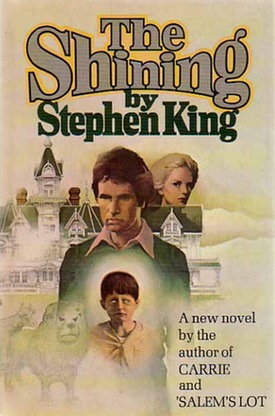 Consciously, King was writing Jack Torrance as a kind of exorcism, coping with his fears that he might lose control and lash out at his kids by expressing them on paper, but it’s what he unconsciously inserted into the book, the silent passengers, that are even more resonant. King has talked about feeling like there’s a component of automatic writing to his work, of getting into a flow where he’s a vessel and the story comes through him, not from him, and the conditions under which he wrote The Shining are optimal for this kind of subconscious dumping. He couldn’t work in the house his family had rented in Boulder, so he rented a room from a woman he never saw, leaving a check for $17.50 under the coffee pot in the kitchen every week. There, he wrote the book over a period of four to six weeks. The Shining is roughly 200,000 words long, which means that he was writing close to 5,000 words a day, every day. That’s a speed at which you’re writing on instinct, and it doesn’t matter how many revisions you make later, the stuff on the page, the material you’re working with, is primal. King was writing from his gut about alcoholism, a perverse urge to self-destruction and, most importantly, about a fear that he might turn into his father.
Consciously, King was writing Jack Torrance as a kind of exorcism, coping with his fears that he might lose control and lash out at his kids by expressing them on paper, but it’s what he unconsciously inserted into the book, the silent passengers, that are even more resonant. King has talked about feeling like there’s a component of automatic writing to his work, of getting into a flow where he’s a vessel and the story comes through him, not from him, and the conditions under which he wrote The Shining are optimal for this kind of subconscious dumping. He couldn’t work in the house his family had rented in Boulder, so he rented a room from a woman he never saw, leaving a check for $17.50 under the coffee pot in the kitchen every week. There, he wrote the book over a period of four to six weeks. The Shining is roughly 200,000 words long, which means that he was writing close to 5,000 words a day, every day. That’s a speed at which you’re writing on instinct, and it doesn’t matter how many revisions you make later, the stuff on the page, the material you’re working with, is primal. King was writing from his gut about alcoholism, a perverse urge to self-destruction and, most importantly, about a fear that he might turn into his father.
King wasn’t just abandoned by his father when he was two years old, he was abandoned by his father who was a failed horror writer. To judge by his books, it hangs heavy on him. In an unused prologue to The Shining called “Before the Play,” Jack Torrance, who will grow up to abuse his son, is abused in turn by his own father while a voice whispers to him, “What you see is what you’ll be.” It’s the ultimate soul-crushing motto for any parent trying to do a better job raising their kids than their own parents did, and it seems to eternally echo in King’s head. From Randal Flagg in The Stand to Bob Anderson in “A Good Marriage,” monstrous men ruin their families and/or kill their children all over King’s books, but the one bad daddy to rule them all is The Shining’s Jack Torrance.
Jack Torrance is every writer’s nightmare. Just gifted enough to get himself into trouble, he’s sold some stories to big outlets but has never been able to live up to his own promise. Instead, he pisses away his money on booze, gets sober after almost killing a kid while drunk driving, then he loses his temper and punches one of his students, gets fired from his teaching job, and is rescued from poverty by his last remaining friend who gets him a job as the caretaker of The Overlook Hotel out in Colorado. It’s a Bizarro World version of King, who did make good on his promise, but who wasn’t sober, and moved his family out to Colorado at their richest, not their poorest.
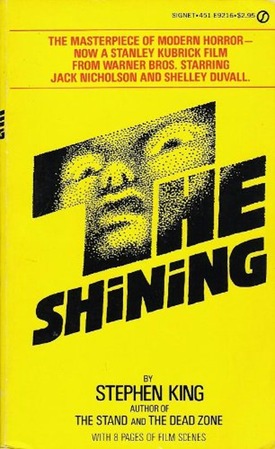 When the Torrances arrive in Colorado two things are immediately apparent to the reader. The first is that it’s very hard to read The Shining after having seen Stanley Kubrick’s The Shining. The two works are totally different, but it’s extremely difficult not to see the faces of Jack Nicholson, Shelley Duvall, and Danny Lloyd superimposed over the Torrance family, to read about Dick Halloran and not hear Scatman Crothers’s voice, to picture The Overlook Hotel and not see the endless, empty corridors of Kubrick’s set. The problem with this is that it creates false expectations: the point of the book and the movie are totally different, their climaxes come in different places, their outcomes are radically different, and so going into one with the memory of the other creates real obstacles for the reader.
When the Torrances arrive in Colorado two things are immediately apparent to the reader. The first is that it’s very hard to read The Shining after having seen Stanley Kubrick’s The Shining. The two works are totally different, but it’s extremely difficult not to see the faces of Jack Nicholson, Shelley Duvall, and Danny Lloyd superimposed over the Torrance family, to read about Dick Halloran and not hear Scatman Crothers’s voice, to picture The Overlook Hotel and not see the endless, empty corridors of Kubrick’s set. The problem with this is that it creates false expectations: the point of the book and the movie are totally different, their climaxes come in different places, their outcomes are radically different, and so going into one with the memory of the other creates real obstacles for the reader.
But it’s a testament to the power of King’s novel that it holds its own against the film. Kubrick was right to reject the killer topiary bunnies and lions of the book for the more sedate hedge maze when he made his movie. The special effects of the day couldn’t have found menace in a bunch of killer, animal-shaped shrubberies without looking deeply silly, and a maze is a far more resonant image on film. While re-reading The Shining I kept expecting to dismiss the topiary animal monsters as silly, but when they showed up they worked. With their blank faces and the way they kept looming up out of nowhere, only moving when no one is looking at them like the Weeping Angels in Doctor Who, they are far more unsettling than you’d expect.
King has criticized Kubrick for not believing there were supernatural agencies at work in the Overlook Hotel, claiming that Kubrick was trying to “psychologize” the ghosts, making them a figment of Jack’s imagination. Kubrick described his movie as, “Just the story of one man’s family quietly going insane together,” but to King, the Overlook Hotel is absolutely haunted by an outside agency. It’s supernatural, not psychological, and while Jack is primed for collapse, it’s not his madness that fuels the Overlook but the Overlook that makes him insane. And yet what we get in the book aren’t so much apparitions and phantasms or shambling undead but a more psychological haunting made up of bad feelings, psychic flashes, and unexplained moments of emotional distress. Yes, there’s a woman in the bath of Room 217, but far more potent is the concrete tunnel on the playground haunted by an unseen dead child who is only glimpsed as a beckoning hand. The topiary animals do attack people, but equally disturbing are the far more numerous visions of past bloodshed. And when Danny has a terrifying encounter with a firehose, it takes up several nightmarish pages to do nothing more dramatic than fall off the wall.
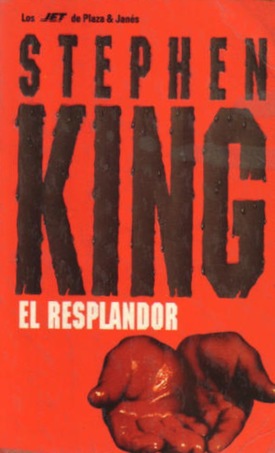 The other thing that becomes immediately apparent on re-reading The Shining is that its roots are in money panic. The caretaker job is Jack’s last chance, and repeatedly he refuses to leave the hotel when common sense (and millions of readers) are signaling that it’s time to get the hell out. Why? Because he needs the money. At the beginning of the book, Jack and Wendy’s marriage is crushed beneath the bootheel of a financial need so profound that it’s twisting their minds all out of shape. If they weren’t so broke they would have options, but they are broke and so they can only plod helplessly towards the Overlook Hotel, praying that they emerge financially solvent and not murdered too badly. Choices are for rich people, not for people like the Torrances. It’s the kind of hopelessness that King, who grew up extremely poor, delivers with great understanding. The Torrances are in peril from forces both supernatural and economic and it’s a heady mix, one fear feeding on the other.
The other thing that becomes immediately apparent on re-reading The Shining is that its roots are in money panic. The caretaker job is Jack’s last chance, and repeatedly he refuses to leave the hotel when common sense (and millions of readers) are signaling that it’s time to get the hell out. Why? Because he needs the money. At the beginning of the book, Jack and Wendy’s marriage is crushed beneath the bootheel of a financial need so profound that it’s twisting their minds all out of shape. If they weren’t so broke they would have options, but they are broke and so they can only plod helplessly towards the Overlook Hotel, praying that they emerge financially solvent and not murdered too badly. Choices are for rich people, not for people like the Torrances. It’s the kind of hopelessness that King, who grew up extremely poor, delivers with great understanding. The Torrances are in peril from forces both supernatural and economic and it’s a heady mix, one fear feeding on the other.
The Shining was King’s first hardcover bestseller, and rightly so. It’s full of smart moments and good writing. That’s not to say there aren’t flaws. King never met an adverb he didn’t like, and the first third of The Shining features characters talking uncomfortably, giggling delightedly, and rubbing their temples gingerly. After stumbling through this Adverb Hell it’s not so shocking when they arrive at the elevator and it wheezes “vibratoriously.” King also writes his first black point-of-view character, Dick Halloran the psychic cook, and it’s not an entirely comfortable fit, maybe because he spent his entire life in Maine, which is officially the whitest state in the country (96.9%).
The book itself was originally going to be called The Shine until a marketing exec pointed out that it was a racial slur. And as King says in an interview, “Both Halloran, the cook in The Shining, and Mother Abigail in The Stand are cardboard caricatures of superblack heroes, viewed through rose-tinted glasses of white-liberal guilt.” He’s being a bit hard on himself here. Halloran does come off as just another Stepin Fetchit at the beginning of the novel, but that’s mostly when he’s interacting with the white characters. When he’s on his own, and when the reader is inside his point of view for a substantial number of pages later in the book, he comes across as a far more fully realized human being.
But these faults pale in comparison to the book’s successes. King is writing “up” here, reaching for a more literary bar than a lot of genre fiction, fleshing out his characters and giving them all time to shine, pun intended. If King’s “shining” is a way of perceiving feelings, of knowing what someone’s thinking without being told in words, then the book itself is a kind of telepathic shining, from King to each reader. Told from four points-of-view (the three Torrances and Dick Halloran) it’s an extended tour of the inside of their heads, a way of getting across how they feel without dialogue.
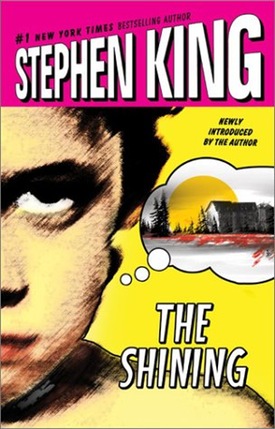 Danny and Jack get the most amount of head time, whereas Wendy, whom King may have figured the audience would automatically be more sympathetic to, gets the least. This reduction of his standard point-of-view rotation to just four characters serves King well. In most horror novels, a scene of the main characters drifting off to sleep in their separate beds would be eminently skimmable, but Chapter 21 “Night Thoughts” is one of the most gripping in the book. As King moves between Danny, Wendy, and Jack as they fall asleep at the end of a long day we get the first seeds of Jack’s impending breakdown, Wendy finally decides to grow a backbone and take some action, and Danny realizes that it’s too late for them to escape what’s been waiting for him at the Overlook Hotel. It’s almost like a mini-mass-market-paperback riff on Finnegans Wake.
Danny and Jack get the most amount of head time, whereas Wendy, whom King may have figured the audience would automatically be more sympathetic to, gets the least. This reduction of his standard point-of-view rotation to just four characters serves King well. In most horror novels, a scene of the main characters drifting off to sleep in their separate beds would be eminently skimmable, but Chapter 21 “Night Thoughts” is one of the most gripping in the book. As King moves between Danny, Wendy, and Jack as they fall asleep at the end of a long day we get the first seeds of Jack’s impending breakdown, Wendy finally decides to grow a backbone and take some action, and Danny realizes that it’s too late for them to escape what’s been waiting for him at the Overlook Hotel. It’s almost like a mini-mass-market-paperback riff on Finnegans Wake.
Even his contrivances are elegantly handled. One of the problems with The Shining is the large amount of infodump required to put across the history of the hotel. King’s solution is to have Jack find a scrapbook that relates its past, which is an awkward solution to say the least. But by foreshadowing the discovery of the scrapbook via Danny’s visions, and by having the discovery of the scrapbook lead to one of the book’s most horrifying scenes (in which Jack impulsively rings up his boss, acts like a giant prick, and almost gets himself fired) King is able to sand down the rough edges and paint over the cracks, weaving it smoothly into the flow of the novel.
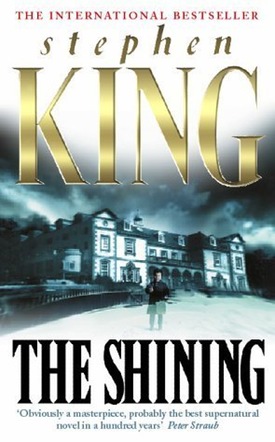 Jack Torrance is King’s deepest fears given life: an alcoholic hack writer who’s one binge away from destroying his family. But the difference between King and Torrance is clear in Chapter 32, the point at which Jack finally drives past the last mile-marker in the land of the sane. It’s the chapter in which he re-reads the play he’s been working on all season and realizes that he hates his characters, he despises them, he wants to make them suffer. If the reader had any doubts that Jack’s gone insane, King seems to be saying, here’s the clearest indication possible. To King, losing sympathy for his characters is the sign of a rotten imagination. It’s King’s biggest taboo, and one he never violates: no matter how bad his characters get, he always finds a way to like them. Even Jack Torrance.
Jack Torrance is King’s deepest fears given life: an alcoholic hack writer who’s one binge away from destroying his family. But the difference between King and Torrance is clear in Chapter 32, the point at which Jack finally drives past the last mile-marker in the land of the sane. It’s the chapter in which he re-reads the play he’s been working on all season and realizes that he hates his characters, he despises them, he wants to make them suffer. If the reader had any doubts that Jack’s gone insane, King seems to be saying, here’s the clearest indication possible. To King, losing sympathy for his characters is the sign of a rotten imagination. It’s King’s biggest taboo, and one he never violates: no matter how bad his characters get, he always finds a way to like them. Even Jack Torrance.
This act of finding sympathy, even for the devil, might be King’s way of reassuring himself that he’s no Jack Torrance. For all of his own self-destructive impulses, for all the hate he sometimes felt towards his family, for all the povery, and suffering, and doubt, he never stopped loving the characters he wrote about, even the bad ones. And, in The Shining, he wrote about the worst one he could possible imagine: himself.
Grady Hendrix has written about pop culture for magazines ranging from Playboy to World Literature Today. He also writes books. You can read more of his deranged mumblings over on his blog.










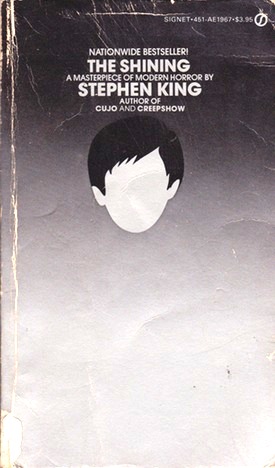
This is fascnating to me – I read this book when I was young (middle or high school, maybe) and certainly it was creepy and eerie and entertaining in tha sense but I obviously never picked up on any of the subtext, nor did I realize that there were meant to be parallels with his own life. This makes me want to re read it :)
Lisamarie, me too, except for the bit about wanting to re-read because (1)
it scared me the way almost nothing else had even when I was a kid and (2) I have kids now, so I suspect it would be even worse.
I’m glad King recognized his Magical Negro tendency eventually, though I could wish it came before _The Green Mile_ (well, I assume that interview was from after it, anyway).
As with Salem’s Lot, I read this book in early high school when I was 14 or so, and while it had its scary moments, I didn’t like Jack Torrance one bit and could not sympathize with him, maybe because I identified too much with the feelings of the powerless boy in the situation. At any rate, I don’t think I have ever reread it, and definitely not to the extent that I reread Salem’s Lot, The Stand, and It over the years. This article made me want to revisit it though. Oh, and I have never seen the Kubrick film, other than the clips that pop up everywhere of the twins, the elevator opening, and of course “heeere’s Johnny!” but I am sure I will still envision Jack Nicholson, Shelly Duvall and the kid.
That’s a fascinating review– much more depth than I noticed in the book more or less when it came out. I’m looking forward to what you might say about addiction in Hearts in Atlanta.
IIRC, there were monsters in Lieber’s Conjure Wife (stone gargoyles, I think) which only moved when you weren’t looking at them.
I really like the point about Jack Torrance committing the great sin of a failure of imagination. I recall him effectively disappearing and being subsumed by the spirit of the hotel, and thus freeing Danny from any idea of patricide at the end. Jack had already committed suicide by allowing his own imagination to be replaced by the hotel’s. A very cogent deranged mumbling, Mr. Hendrix.
This was the first horror novel I ever read, way back in Junior High School. And at first, I thought it was so lame.
All these pages and pages about a messed up, unhappy family. That wasn’t scary to young!me. It was just depressing.
Then I reach the chapter with room 217 and the dead woman in the bathtub.
I had to sleep with a light on for two weeks.
Well played, King. Well played.
It’s funny, one Halloween, before the serialized GREEN MILE was coming out, I was walking through a university bookstore and saw THE SHINING in a display for Halloween novels. I had been a major Stephen King fan for years but then stopped reading him for some reason or other. It was Halloween, I hadn’t read Stephen King for quite some time, and it was Halloween so I picked up the book, bought it, and dashed home. When I put the book down after finishing reading it I couldn’t remember why I had stopped reading Stephen King in the frst place. So I caught up with every King book I hadn’t owned before that. Of course with the Shining I had seen the movie as a kid. I remember seeing the trailer in the movie theater. The shot on the elevator doors, then the doors opening and the ocean of blood pouring out. I loved the movie when I did see it. But neither prepared me for the book. The book was awesome, totally blew me away and reignited my love for Stephen King.
What”s cool about this post is that I had a tradition every Halloween to read a Stephen King novel that started with the SHINING. This year, yesterday, I started re-reading the SHINING again for my annual Stephen King re-read.
Cool beans.
Hating your own characters is definitely wrong. I know how hard it is to have characters you practically gave life, like they are your children, and have them get tortured or hurt in any way. The more I’ve gotten to know mine, the harder it gets to hurt them when the plot demands it. I had done a passage recently that nearly brought me to tears, and that isn’t the worst I’m going to do.
It’s also hard to hate any of your characters since you know their story, why they are like they are during the story, that unwritten story that doesn’t make it into the book. Just makes me want to hug some of my characters if I could.
John @6, it happened the same way with me. I was reading along, a little bored, then the chapter with room 217 came along. I actually screamed and threw the book as far away from me as I could and ran from the room to sit with my sister. Who made fun of me. I made sure she didn’t know I slept with the light on for a while after that.
I later went back to it, but never ventured inside room 217 again. I’ve read it a couple of times, maybe every 10 years. Each time I read it, something different terrifies me. Interesting.
Having complained about some things in your previous installments, let me say this is just a great piece, and not just because you liked the book as much as I did! I was surprised to hear how much autobiography is in there– I knew a little, but I had only read Danse Macabre, and he’s not as forthcoming in that about how messed up he was.
Especially nice point about Jack hating his characters; I never noticed that, but now that you mention it, I can’t think of any other of his writer characters who crossed that line, except in Misery where the guy was doing something he never really cared about in the first place. And Eugene @5, that’s a good point too. King really hammers home that theme, so to speak, by having the hotel literally destroy Jack’s face (which is still an awfully disturbing image for me), but he builds up to it all along as Jack puts more and more energy into appreciating the hotel– like how some people redirect everything into a new job/hobby/religion, in a way that leaves no room for who they were.
I agree that Kubrick’s movie, though it’s a classic, is just too different in intent to really compare. The main thing that bothers me about the movie– not because it departs from the book, but just because of what I find interesting in stories about people– is that you never really get to see Jack’s fear of failure on a human level, the vulnerability of being a young father and an addict, because Nicholson is such a powerful aggressive presence. That’s was one of the good points of the largely awful TV version– the actor wasn’t remotely in Nicholson’s league, but he conveyed that weakness pretty well.
Also, thanks for posting all those book covers. I can’t stop looking at the second one– it’s like an encyclopedia of bad design ideas, and the main topiary monster seems to be an annoyed Samoyad.
I like your observation about the writers who cease to feel sympathy for their characters. I’m not sure it’s a universal attitude among writers, but I believe it’s something I’ve absorbed from Stephen King. I find it difficult to enjoy some of the more plot driven authors once I start to get the sense that they’ve lost sympathy for their characters.
I think one of the things that makes Stephen King such a standout in the horror/suspense genre is that he genuinely likes all of his characters and seems to forget that they’re paper constructs. Authors who lose that sympathy, and then treat their characters as cardboard backdrops for gruesome death and torture scenes end up losing my sympathy along with my interest.
Man, I’m listening to this right now having not read it since college. It really packs a punch now that I have kids and a family.
What strikes me this time is how long it takes to get to the Overlook and how much time King spends setting up these characters. It’s a massive investment and there are only three and a half main characters. That’s it. It’s such a small ensemble for such a long book. But, it’s a nice slow burn.
The one thing I’m curious about, and I hope you’ll keep us appraised for those following from memory, is when does his overuse of adverbs start abating.
It’s bloody brilliant to see how bad he was back then(I haven’t read these old ones in a while), because I know in On Writing he says to kill all the adverbs. So I’m interested to know when it began to abate? Maybe when he changed publishers again, and they assigned a different editor?
He seems to be easing up on his adverbs starting with The Stand, and his writing gets so much better with The Dead Zone and Firestarter. And I also think The Stand marks his last use of the word “heliograph” which he has used in almost all of his previous books except Carrie and The Shining (it’s used the most in ‘Salem’s Lot and Night Shift, then at least once in The Stand).
The Stand makes sense, I think I recall reading that several hundred pages were cut to make it sellable, the original paperback price, as written, was like $10 in 1980’s money.
“Jack Torrance is King’s deepest fears given life: an alcoholic hack writer who’s one binge away from destroying his family.”
What an excellent point.
I would like to know how one would cite this source. I need it for an english research paper and I’d rather not plagerize….
The Shining was the first King book I ever read. And the circumstances couldn’t have been more perfect/worse. I was the only night shift DJ in a small-town radio station, situated high on a hill outside of town. After midnight, the AM side shut down, and the FM side was fully automated; I just had to go check on it now & then. I wouldn’t have been there past shutting down the AM except there was a howling blizzard outside, and when I went to leave I realized there was no way I could drive down that hill without sliding into a deadly crash at the bottom. So I decided to stay overnight. Keyed up, I wasn’t ready to try to sleep on the Naugahyde couch in the office. I spotted a book – The Shining. Worth a try.
Har har har. I was hooked by the second page and read the whole thing in one go. And it scared the everlovin’ crap out of me. I wasn’t a horror reader beyond The Haunting of Hill House a decade earlier. I was NOT ready for what King dished up. And I have always been a gullible reader: I never can guess the murderer in a mystery. And believe it or not, I never guessed until King revealed it toward the end, just who/what it was that Danny kept having visions of chasing him with a mallet. Yoicks.
I’m enjoying your series here a lot! Thanks!
Heliograph update: I can confirm that he does indeed use the word after The Stand. I’m reading through everything in chronological order….just finished The Running Man a few days ago and he uses it there. Just started The Gunslinger this morning, and sure enough he uses it in the first 10 pages. I can report back with further findings as I progress through his bibliography. :)